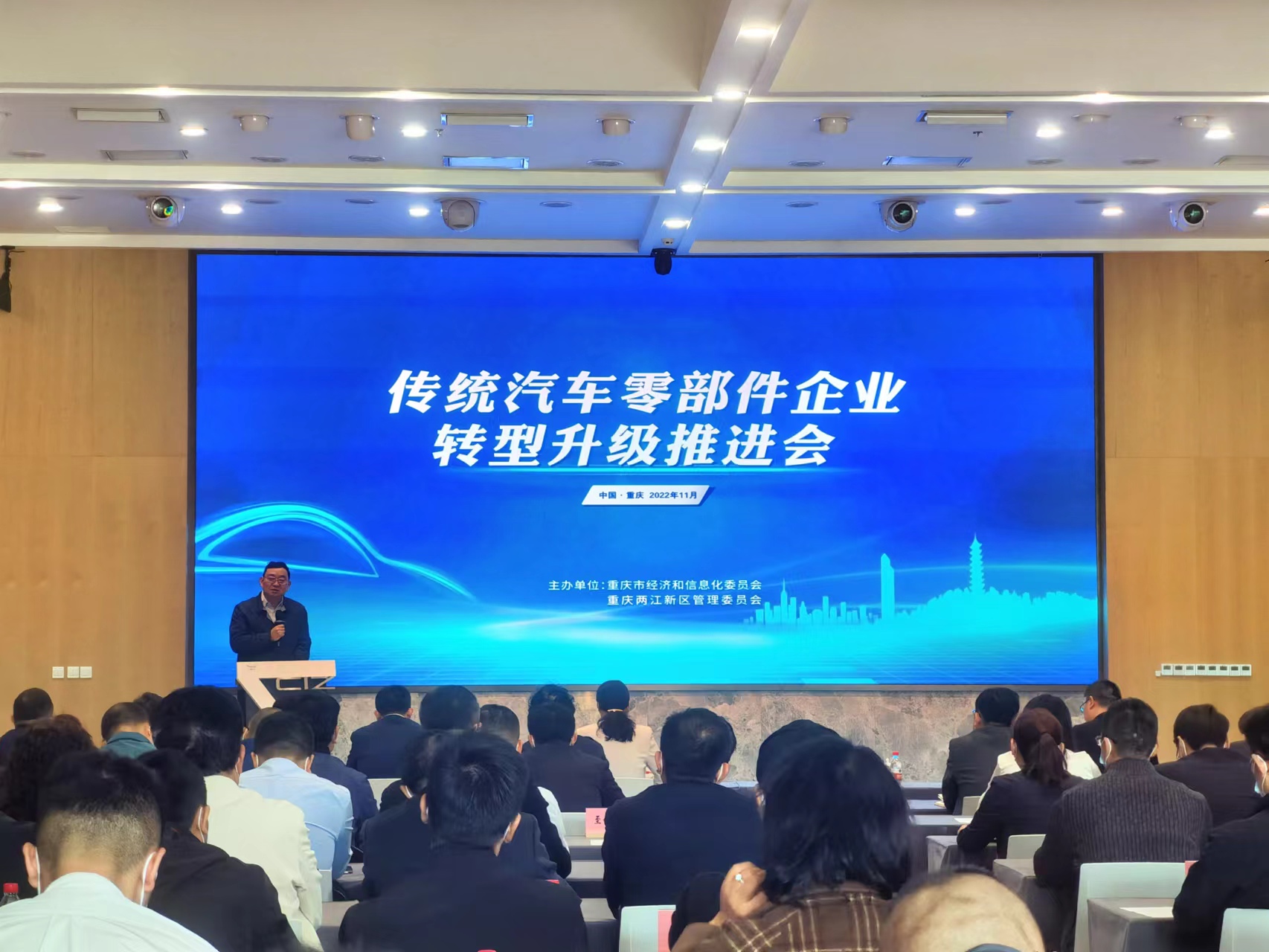Benchmarking Against the Guiding Principles of the 20th CPC National Congress: Chongqing Automotive Parts Enterprises Strategize Transformation
The Report to the 20th CPC National Congress stated that "To build a modern socialist country in all respects, we must, first and foremost, pursue high-quality development" and "We will carry out industrial foundation reengineering projects and research projects on major technologies and equipment; support enterprises that use special and sophisticated technologies to produce novel and unique products; and move the manufacturing sector toward higher-end, smarter, and greener production." As a pillar industry of Chongqing's manufacturing sector, how can the automotive industry enhance supply chain capabilities and facilitate the transformation of automotive parts enterprises?
On November 2, the Promotion Meeting for Transformation and Upgrading of Traditional Auto Parts Enterprises - co-hosted by Chongqing Economic and Information Commission and Liangjiang New Area - convened representatives from leading automakers and 60 key parts suppliers to brainstorm the upgrade of Chongqing's automotive parts enterprises.

Benchmarking against the guiding principles of the 20th CPC National Congress, participants from government agencies, OEMs, and parts suppliers unanimously highlighted three keywords: new trends, intelligent transformation and supply chain.
New trends
"Strategic pivoting": intelligent connected NEVs present new opportunities
Industry experts unanimously identified intelligent connected and new energy as definitive automotive trends.
Nationally, NEV penetration reached 24% in the first three quarters - surpassing the 2025 target of 20% in the China's New Energy Vehicle Industrial Development Plan. NEV development has transitioned from policy - driven to market-driven, with penetration projected to hit 45% by 2025.
Chongqing's NEV output accounted for just over 15% of total auto production during this period - below the national average. How should parts suppliers capitalize on intelligent connected and NEV opportunities?
Xu Lin, Rotating President of Seres Group, noted that automotive chassis systems are transitioning from traditional chassis to drive-by-wire chassis and toward integrated ecosystem chassis. Since Chongqing lagged behind in the field of drive-by-wire chassis, ecosystem chassis that is deeply integrated with intelligent cockpits might present a leapfrogging opportunity for local automotive parts enterprises.
Intelligent transformation
"Strengthening advantages": consolidating traditional strengths
Transformation isn't about starting from scratch. As a nationally significant production base, Chongqing's automotive parts enterprises hold competitive advantages in multiple domains.
Chen Wei, Executive Vice President of Changan Automobile, emphasized that traditional components like stamping parts and interior and exterior trims remain essential for both ICE vehicles and NEVs. Chongqing is home to many high-quality enterprises in these segments, laying a solid foundation for participating in market competition.
How to strengthen advantages? Chen urged enterprises to intensify intelligent manufacturing adoption for quality and efficiency improvements.
Intelligent transformation can also build new advantages in intelligent connected and NEV sectors. At the promotion meeting, several experts from parts enterprises shared success stories of how intelligent transformation has benefited their businesses.
Cai Baowei, General Manager of Chongqing Huguang Auto Harness, described wiring harnesses as traditionally labor-intensive. Parent company Kunshan Huguang Auto Harness initiated smart upgrades for cost control. With the rapid development of intelligent connected vehicles and NEVs, increasingly complex circuits have raised the requirements for harness design and manufacturing. Early digitalization enabled the company to become a MIIT's "Intelligent Manufacturing Pilot Demonstration" enterprise.
Tsingshan Industrial also reaped smart manufacturing dividends. Ye Wanhua, Deputy Party Secretary of Tsingshan Industrial, shared that in 2021, the company launched China's first self-developed hybrid transmission - a milestone closely tied to its intelligent transformation strategy.
Supply chain
"Addressing weaknesses": localized and adaptive supply chain upgrading
Transformation requires addressing targeted weaknesses. Experts identified structural weaknesses in Chongqing's automative parts supply chain.
Wang Chunshui, Deputy Director of Chongqing Economic and Information Commission, pointed out that the city's automative industry suffers from being "hardware-heavy", "light on electronics", and "short on chips". That is, automative parts enterprises are primarily focused on mechanical processing; their capabilities in "software-defined vehicles" need improvement; the automotive electronics industry is underdeveloped; and the local supply capacity for automotive chips is insufficient.
To address these issues, most of the expert opinions reflected a localized and adaptive approach.
Xu Lin suggested that automotive parts enterprises should make full use of Chongqing's favorable policies to develop automotive software. For example, Chongqing has launched the "Starry Sky" Action Plan for the software and information services industry. Local automotive software enterprises can ride this wave to grow, and companies from outside the region can also consider setting up operations in Chongqing.
In response, Li Jie, Deputy Director of the Liangjiang New Area Administrative Committee and head of the automotive industry chain, stated that to accelerate the development of the automotive software industry, Liangjiang New Area will encourage some vehicle manufacturers to spin off their information technology operations and establish independent legal entities, thereby concentrating superior resources to strengthen and expand software and information service businesses.
Chen Wei believes the approach to "Addressing weaknesses" in the supply chain can be expanded further. In areas where localized supporting capabilities cannot be achieved in the short term, companies can adopt models such as joint development with external suppliers or "self-development + OEM" to enhance the bargaining power of Chongqing's vehicle and parts enterprises within the supply chain. For instance, Changan Automobile has cooperated with Desay SV, a leading domestic automotive electronics company, to jointly develop a central computing platform for autonomous driving, sharing intellectual property rights. Chongqing's automotive parts enterprises can also learn from this model by engaging in deeper collaboration with upstream enterprises - especially chipmakers - beyond procurement, to further enhance the capability level of the industrial and supply chains.
Source: Chongqing Daily



 渝公网安备 50010502003501号
渝公网安备 50010502003501号